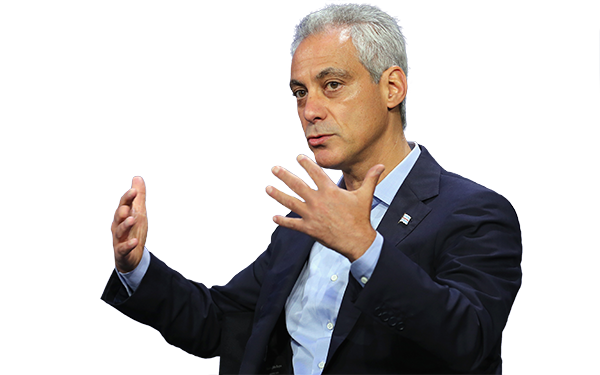Rahm vs. the Teachers Union II? Teachers Vote To Strike, Will Politics Play Differently This Time

Updated 11 a.m. Dec. 15
An "overwhelming" majority of Chicago's 27,000 teachers voted last week to authorize a strike, their union announced Monday, Dec. 14. Union head Jesse Sharkey warned that Chicago Mayor Rahm Emanuel did not need a teachers strike but "what we’re telling him is if he doesn’t listen to us, that’s what he’ll get.”
One early morning in September 2012, the political machinery that ignited a democratic upheaval not seen in Chicago in more than two decades was just warming up. Thousands of city teachers whipped on red T-shirts and circled the blocks in front of their schools, decrying Mayor Rahm Emanuel’s administration for what they said were days that ran too long and support that ran too short.
Volunteers drummed up games and treats just before they opened the doors of churches and community centers for bewildered working parents with no other place to bring their children. Behind closed doors, union leaders and school district operatives began negotiating counterpoints for one another — and crafting spin for those on the outside.
The Chicago Teachers Union had declared its first strike in 25 years. For seven days, teachers picketed instead of taught, exposing the world to the deepening rift between Emanuel and his educators.
Now, only three years later, that machinery is reassembling itself for Round Two. On Wednesday, the 27,000-member union will begin a strike authorization vote that could take as little as three days, a necessary step before the union members can strike again over their contract which expired in June. Though a strike is not likely before May because of lengthy procedural steps the district and the union must take first, both sides are already strategizing to drum up public support.
The Chicago Teachers Union, which emerged from the 2012 strike bolder and more powerful than before, is again going up against Emanuel, whose political stock is plummeting over the shooting death of a 17-year black teenager by a white cop. But complicating the equation is a state budget impasse in Springfield that puts the union in danger of asking for too much too soon from a cash-strapped school system threatening to hand pink slips to teachers.
“The math of it all gets very complicated,” said Dick Simpson, a former city alderman and politics professor at the University of Illinois-Chicago. “What the teachers should be willing to settle for is quite unclear. One of the things they would want is not to lose the thousands of teachers jobs.”
A strike as community-wide struggle
When the Chicago Teachers Union first announced it was striking in 2012, who would emerge as the political winner remained an open question. Emanuel called the CTU’s actions a “strike of choice” in an effort to cast their actions as an unnecessary negotiating tactic that hurt Chicago families.
But the CTU was able to politically capitalize not only on the discontent among its own ranks but also among some parent communities by arguing that the mayor was beholden to corporate interests and out of touch with city residents.
That May a poll conducted by The Chicago Tribune found that 40 percent of city voters supported the union compared to 17 percent who supported Emanuel’s education agenda. Support for the union was even larger among city parents (A 2014 follow-up poll by the newspaper showed that the two-thirds of the city sided with the union on education issues over Emanuel).
“In 2012, the bargaining became a community affair,” said Robert Bruno, director of the University of Illinois’ labor education program. “This was clearly a community-wide struggle. That had never been the case before.”
In the end, the city agreed to increase teacher salaries, hire more educators to support existing teachers at elementary schools where the school day would be lengthened. Student test scores would be phased in, eventually making up 30 percent of a teacher’s evaluation as dictated by a newly passed state law.
The union could claim victory.
“We severely underestimated the ability of the Chicago Teachers’ Union to lead a massive grassroots campaign against our administration. It’s a lesson for all of us in the reform community,” former city schools Superintendent Jean-Claude Brizard told the Thomas Fordham Institute a year after the strike.
“The ‘how’ is at times more important than the ‘what.’ We need to get closer to the people we are serving and create the demand for change in our communities.”
The success of the teachers strike in Chicago prompted conversations among unions and progressive groups across the country; The American Federation of Teachers planned a series of town halls in urban areas to talk about the issues the strike brought up, according to The Washington Post. In Illinois, teachers unions in Grayslake, Lake Forest, Dixon and other communities reportedly held their own strikes after the Chicago standoff.
To make matters worse for Emanuel, Lewis became a household name as she considered running against him in the 2015 election but declined after being diagnosed with brain cancer.
The CTU then recruited Jesus ‘Chuy’ Garcia, a Cook County commissioner with a low profile who was able to force Emanuel into an embarrassing runoff election with the union’s support. Garcia lost, but put up an impressive fight against a sitting mayor with a much larger financial war chest. The Chicago Teachers Union was also able to ensure the victory of union member Susan Sadlowski Garza for alderman in Chicago’s 10th Ward.
A $1 billion in demands and different times
The power and grassroots support amassed by the union after the 2012 strike now puts Emanuel in a difficult position. If the district lays off teachers because of its budget crisis, the mayor might lose more support from families who will watch their class sizes grow and their support services decline. If Emanuel lets the clock tick toward a strike, he may get handed another political blow by the union’s energized base.
Adding to those tensions is the recent release of a damning video of the shooting death of Laquan McDonald, the black 17-year-old slain by a white cop, prompting some city leaders to call for the mayor’s resignation.
“There is no way for the strike to be wonderful for Rahm Emanuel,” said Simpson.
But the CTU faces its own risks by ramping up the pressure against Emanuel’s administration through strike threats.
The union is asking for hundreds more counselors and case managers, a 3 percent salary increase, 1,000 school nurses, psychologists and social workers and pay for snow days, the school district told The Chicago Tribune. On top of those requests, a union request to decrease class sizes would require the hiring 5,000 more teachers, putting the total cost of its proposal at more than a $1 billion, the newspaper said.
The union’s requests may look like an overreach in the face of news about the state and city school district’s tight finances though union leaders have acknowledged that all of what they are seeking might not be possible.
In Illinois, the state pays for every school district’s share of teacher pension payments — except Chicago’s. Individual educators are also required by law to contribute 9.4 percent of their salary into the retirement system, but 64 percent of school districts have negotiated with local unions to pick up teachers’ required contributions, according to the Illinois Policy Institute, a local think tank.
Chicago is no exception. The city school system pays 7 percentage points of that contribution — a perk Emanuel’s administration is hoping to eliminate. But the union contends that cutting the pension pick-up would amount to a pay cut. Besides, the city could look at TIF financing, a pot of money reserved for economic development, to address its budgetary challenges, the union has said.
“They are making a strong argument that they are just not capable of paying,” Bruno said. “The teachers union has (been) saying ‘Well wait a minute we recognize the financial challenges (but) there are things you’re not willing to do.’”
The city would also like the teachers union to turn its attention to the state capitol in Springfield. Newly appointed Chicago Public Schools CEO Forrest Claypool has said publicly that unless the state shoulders more of the school district’s pension liabilities, the city will have to layoff thousands of teachers and increase class sizes. The district has said the layoffs could take effect on Feb. 8.
“Parents should not have to wonder each year if a program that is helping their child will be eliminated by budget cuts, and principals should not lose sleep over the thought of raising class sizes or laying off staff,” he wrote in an editorial in The Chicago Tribune. “And our retirees should not have to suffer anxiety over the state of their pensions — not after dedicating their professional lives to the children of Chicago.”
But help from Springfield is a long way off if, it’s coming at all.
For months, the state legislature and newly-elected Gov. Bruce Rauner, a Republican businessman, have been in a budget impasse. As Illinois’ unpaid bills tally up in the billions, Rauner and the Democratically-controlled state legislature have yet to pass a permanent budget either side can agree on.
And though Rauner and Emanuel are reportedly friends, the governor ran on a platform of fighting unions and cushy public benefits and Emanuel backed the governor’s Democratic competitor. Critical state lawmakers also contend the city’s public school system has access to types of financial resources other school districts don’t.
Count Alana Baum as one Chicago parent who supported the teachers strike in 2012 but now thinks the union squashes dissent and is more motivated by self interest.
“With Illinois ranking almost lowest in education funding, schools strapped for money, cuts looming, why is the union choosing to battle the city for money it doesn't have? Why not join forces to push for increased state funding?,” she wrote in an editorial in The Chicago Tribune.
The fight is far from over. The union filed an unfair labor practice claim on Monday with the Illinois Education Labor Relations Board, where three of the five members were appointed by Rauner, claiming the city school system is stalling negotiations.
That same day Superintendent Claypool made a plea in a press conference to the union to help them lobby state lawmakers for more money, according to The Chicago Tribune.
"The answer is not a strike,” Claypool said. “The answer and solution leads through Springfield and getting equal funding for Chicago's schoolchildren."
Get stories like these delivered straight to your inbox. Sign up for The 74 Newsletter

;)
